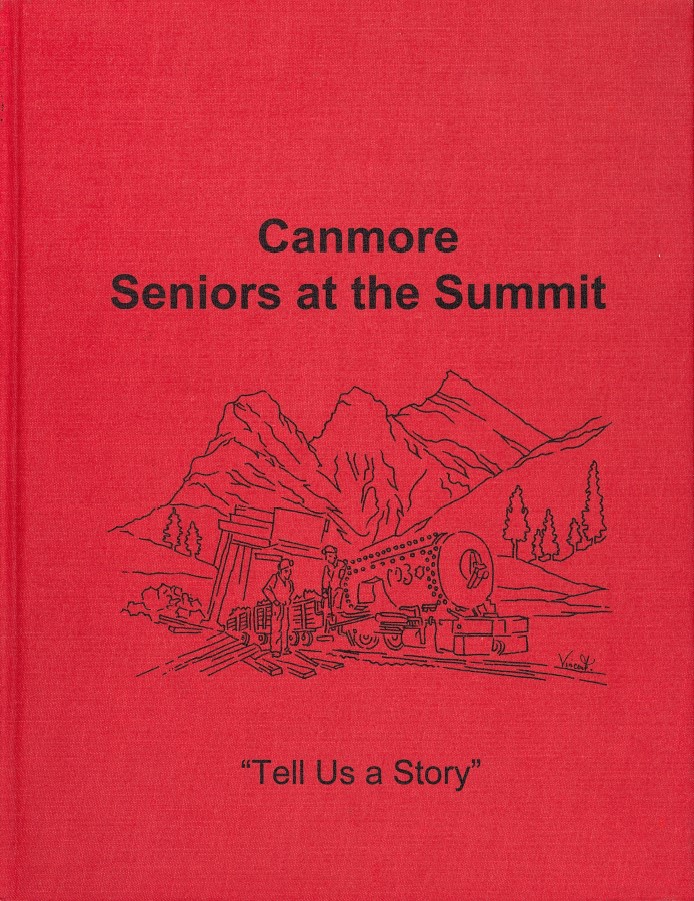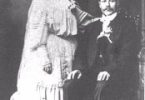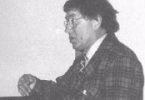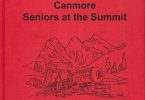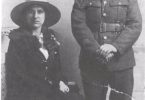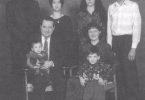Well then – you’d like to know how I got to Canmore. It is a very long story, and risking the chance that I might bore you, I’ll tell you anyway. Do you believe in Guardian Angels? If they really exist, I must have had quite a few over the years. I grew up in a small city in Northern Germany. My childhood was not much different than that of other kids my age anywhere else. I got into trouble without even trying – but these were only little things, quite harmless compared to troubles kids get into nowadays. As was customary at that time in Germany, I left school at fourteen years of age to start an apprenticeship of three years.
In the summer of 1938, I met a very nice girl and fell in love with her. I was going on seventeen and she was only fifteen, but very mature for her age. A Midway came to town that summer, like it always had, with beer tents and dancing to oompa oompa music. My girlfriend, Sonja, came from the Harz Mountains and stayed with her aunt for the holidays, so it didn’t matter too much at what time she came home from dancing at the Midway. But my parents ! Dad didn’t like my coming home late every night, running around with dreamy eyes.
Then came the day that Sonja had to go back home to her parents. We were heartbroken and I promised to see her the coming weekend. When my father found out about my plans, he strictly forbade me to see my love. I was determined to visit her, come hell or high water. Saturday came. I only had to work until noon. I made myself sandwiches, took my bicycle, jumped into the saddle and started to peddle the long distance of 200 kilometres to get to my girlfriend before night fell. However, I was a Flat-Tyrolian and didn’t know how steep roads in the mountains can be. When it started to get dark, I had travelled only 150 kilometres that afternoon. I was getting tired and checked into a Youth Hostel in Bad Harzburg. Early the next morning, I was on my bike again to travel the remaining fifty kilometres. However, it took me until noon to get there. Sonja and I spent the afternoon together, alone. We were very happy and almost cried when evening came and I had to ride my bicycle 200 kilometres all through the night. Since it was down-hill, I expected to be home in time to go to work.
I rode my bicycle all through the night. When daybreak came, I was tired. Boy, was I tired! I even dozed off while peddling and ended up on a horse and wagon road beside the pavement. In Braunschweig, I had to rest on a bench in a park and fell asleep for a few minutes. I then continued riding my bicycle. However, I was so tired that I missed the turnoff to my town and had to ride the long way home. So I was two hours late for work.
When I reported to my boss, he asked me whether I’d seen my father. My dad had quit my apprenticeship and left an order for me to see him at work as soon as I showed up!!! So I did. My father told me to go home and wait for him. I didn’t know what to do because I knew what was coming. Should I run away or hang myself? So I waited for my dad and what he had in mind to do. If I had known his rage because of my disobedience, I would have run away. Boy, did I get a beating, a merciless beating. When my father couldn’t hit and punch me anymore, he started kicking me while I was on the floor. He didn’t care where he kicked me, whether it was my body or my head. The ordeal stopped only when he was out of breath. I could hardly move and it was a wonder that I didn’t wet myself!
The next morning, I had to go with him to the Youth Welfare Department. My father insisted that I be put in a home for juvenile offenders. However, the department did not see eye to eye with my father, because I had not committed any crime at all, but I had to be disciplined. The punishment was three months on a farm as harvest helper. Afterwards I could finish my apprenticeship.
So there I was on a farm. When I arrived there, the farmer showed me my room. I thought I lived somewhere foreign, in a different century. You had to go through the pigpen to get to my room! There was no running water, an old stinky bed in corner with no sheets, nails on the wall to hang my clothes and dirt floor. Oh, yes, there was an old cabinet for my belongings and a chair. I found out later, quarters for farm hands, in general, were no better.
After a few minutes, the farmer came back and asked me if I thought I was on holidays. “Lunchtime is over and we’re going back to work in the fields.” Well, I found out how hard farm work is. Rye had to be harvested. There was only a machine for cutting; everything else had to be done by hand. By now, I was getting very hungry and was glad the coffee-break came. I was served two slices of rye bread with butter and marmalade, made from sugar beets. I was not quite seventeen-years-old and hungry. When I asked for more, I was told that coffee break is for eating a little, not stuffing yourself.
A week or two later, a Saturday dance was held in the village’s inn. I put my suit on and was about to leave when the farmer’s brother saw me and asked what I intended to do in my good clothes. “Going dancing,” I replied. “Oh no,” he said, “You are going to feed the pigs and other animals.” “That will be the day,” I thought, and told him that I was a harvest helper, not a farm hand. “Get out of your suit,” he ordered. When I refused, he grabbed a whip and horse-whipped me so bad that I couldn’t help screaming aloud.
Well, I got out of my suit all right – but not to feed the pigs. I took my bicycle and when the coast was clear, I took off for home. I had gone maybe ten kilometres when I heard a moped closing in on me. It was the farmer. On my bike, I went through a ditch to escape but the farmer, on his moped, followed and caught me. He threatened to beat the heck out of me if I didn’t follow him back to the farm. That was the end of my great escape.
Now, things like this could never have happened in Canada, but this was Germany of 1938. Horsewhip a kid of sixteen? He is not a member of the Hitler Youth and has to be taught to follow orders. Kidnapping the boy? Nonsense! He is being brought back to learn discipline. Detained against his will? It is for his own good! Such were the times in Germany in 1938.
I was able to get away from the farm after all. The farmer had to give me a day off sometimes. On my next day off, I went home to see my mother. She didn’t like the way I was treated and talked to our family doctor who wanted to see me. This I did and the doctor pronounced me unfit for work, meaning that I was sick.
While I was home for almost eight weeks, I met a school buddy of mine. He was a sailor and gave me an address I could write to if I wanted to go to sea. Hurray, hurray! I wrote a letter to the North German Lloyd, applying for a job on a ship. I was so happy when the reply came a short while later, to appear in person. Now there were a few formalities to take care of. I was not eighteen years old and needed my parents’ permission to go to sea. Then I had to see the Youth Welfare Department, too!
By the day of my appointment with the Welfare Department, I had not made up my mind – whether to go back to my apprenticeship or go to sea. Even when my name was called to see the officer, I didn’t know what to do. Apprentice or sea – apprentice or sea. The large door to the office opened, and like a robot, I walked toward the huge desk. Apprentice or sea?
I must have been very pale. Everybody looked at me with large eyes. Apprentice or sea? I was about ten feet away from the officer’s desk, when I heard voice talking to me: Go to sea, go to sea … I didn’t say a word, turned around and walked out of the office with stiff legs. Was that my Guardian Angel I heard?
It came easy to say good-bye to my parents. I am going to sea to become a sailor! That is all that matters! I was very happy and didn’t worry about the future and thought when I come back from sea, I’ll marry Sonja.
Now I was in Hamburg, standing in front of the freighter Nienburg, a 5,000 ton ship bound for the Amazon River in Brazil. I had hired on as a deck boy and was now a member of the ten-man deck crew. And what a crew it was – only one sailor over thirty, the rest between eighteen and twenty-two.
By now I was seventeen, rather old for a deck boy. I had to learn fast to be advanced to Ordinary Sailor – and that I did. I learned how to splice a rope and all the “How to Do” things that a sailor is required to know – even how to steer a ship! Christmas came but for people at sea, it was a day like any other day, except for even better food and a party in the mess hall, with lots of drinking and big fight with some blood-letting between the sailors and the engine crew.
Early January, 1939, we approached the Equator. No ceremony was planned since a day later we would arrive in Para and the ship had to be made ready for unloading and loading freight. However, around noon I was called on deck to see the Equator Line. I knew there was no such line around the Globe but was very much surprised when I saw one – a dirty yellow line as far as the eye could see! It was the yellow water of the mighty Amazon River discharging into the sea. Although there was no land in sight, the Amazon had not mixed with the ocean a few hundred miles into the sea!
For me it was quite a thrill to go up the Amazon River in the middle of January, the temperature being over 30 degrees Celsius. Although the mouth of the Amazon is over 100 kilometres wide, there are hundreds of islands in the river and on most of the trip up river you could see lush green jungle with many gigantic trees.
When we arrived in Para, there were a few very pretty young girls standing at the pier, waving at us. Most of the deck hands had planned to spend the night together in the Red Light District. After we had showered and dressed for the occasion, we marched off to see the senoritas – a sailor with his accordion in front and I, the youngest one, in the rear carrying the alarm clock to awaken the sailors in the morning.
If one didn’t know where you were, you could believe you were in a dance hall. The girls were all young and beautiful and on the dance floor, the girls were the ones who initiated close dancing. Well, I had a really good time. It was hot in the dance hall and its guest rooms. When morning came, I was wakened by something cool running over my bare back – a lizard catching insects! It was time, anyway, to wake up my sleeping buddies. But where were they? A door opened to a verandah which ran along the building over a beautiful courtyard with exotic flowers. Not knowing which rooms my comrades occupied, I went from door to door, pounding them and yelling, “Rise and shine, rise and shine.” Although my intentions were to wake up only my buddies, I woke up the whole building!
After a few days in Para, the Nienburg went up the Amazon River. We had two river pilots aboard and they knew where it was safe to swim. The water was clean in this arm of the river and I went for a swim whenever possible. We had come here to load mahogany wood and tied up to huge trees. One night, a very strong storm came up, snapping the steel ropes. The Manilla lines held for a while and never broke, but then the wind was pushing so hard against the ship that it uprooted the giant trees and the ship was adrift in the river. We dropped our two anchors in a hurry and this saved our ship from being stranded.
While tied up at trees large rafts came drifting down the river, consisting of mahogany and other logs. At the ship, Indians were cutting the vines which held the raft together. Since the mahogany logs were heavier than water and could not float, they sank to the bottom and the remains of the raft continued floating down the river. It was interesting to see the Indians diving to tie up a log so it could be hoisted aboard the ship. They were able to stay submerged for a very long time.
At one of the loading places, a sailor bought a boa constrictor, about two metres long, to sell in Antwerp, but first to have some fun. While the oldest sailor was taking a shower, the snake was hidden under the blanket on his bunk and when the sailor returned and pulled back the blanket, he nearly suffered a heart attack! After returning to Para, we ran down the coast to Ceara, where some of the sailors were fighting with the police and were arrested and kept in jail for two days.
With the Nienburg, I went to New Orleans, Tampa, Boston and other US ports. I left my ship to hire on the German luxury liner, “Europa” and made a couple of North Atlantic crossings. I had an aunt living in New York and she told me time and again not to come back to New York because the war could break out any day. It was during the last week of August, 1939, when another German liner was in port. It was the 32,000 ton cruise ship, “Columbus”. They were short a deckhand and I had the gut feeling to go after the vacant job. When I hesitated some, I heard an inner voice saying over and over again – hire on – hire on. So I did. When I said goodbye to my aunt, she called me crazy for not going back to Germany but to sail the West Indies instead until Easter, 1940. Was it my Guardian Angel again, telling me not to go back to Germany?
The “Columbus” sailed from New York with 1,000 passengers. Everything seemed normal and passengers and crew were relaxed. But all of a sudden, things changed. There were two ships on the horizon following us in the distance. What are these ships? Are they war ships? Did the war start already? We could only speculate. Then came an announcement – we are not continuing the cruise but are going to land the passengers instead. But where? We went from port to port. Nobody was willing to take the passengers. What was going on? Not even in Wilhelmstad could we land the passengers or get water or fuel, although Curacau is an oil producer. Are they trying to prevent the passengers from landing so the ship could be captured if war breaks out? So many questions but someone was willing to take the passengers. A coastline came in sight – Cuba. The passengers left the “Columbus” in Havana. Many would have liked to stay aboard the ship for the excitement of things to come. We received all the water and fuel we wanted and left Havana for an unknown destination a day before the outbreak of World War II. The next day, Germany invaded Poland and during the night we were able to shake off the two ships following us. On September 3rd, England and France declared war on Germany. We didn’t know what would happen if the two ships which had followed us before should suddenly show up. We were sure they were war ships and would sink us. Night came and suddenly many lights appear. Did they catch us and will they sink us? Thank God, we had arrived in Vera Cruz, Mexico!
The harbour of Vera Cruz was not deep enough for the “Columbus” so the ship was moved off the coast of the fishing village, Anton Lizardo, but within the three-mile territorial waters. Life aboard the “Columbus” was very boring and food was getting lousier every week. One day, I saw sharks swimming around the ship, munching on crates which had been thrown overboard. And what did these crates contain? Chicken! Instead of feeding chicken to the crew while still good for consumption, it was thrown overboard when getting bad.
Every day, a boat went to Anton Lizardo for swimming at the beach. One day, like always, a boat left the ship in bright sunshine. Then all of a sudden, a black cloud appeared on the horizon. A “northern” came up. Within minutes, the whole sky turned dark and the sea was getting rough. A signal was sent to the beach party to return to the ship at once. We could see the boat coming closer, fighting the wind to reach the ship – but the wind was of hurricane force by now and the boat drifted by, disappearing in the rough sea. Immediately, the fastest motor boat, a self-bailer, was launched with four crew members and one officer aboard to rescue the beach party. It was pitch dark by now. Through the storm, we could hear a motor stop. Then it started again and the boat came closer. Suddenly, the motor stopped again. Then nothing. You could only hear the howling storm. A raft with an emergency light was lowered into the water. Rope after rope was added and the light disappeared into the darkness. Again, nothing. Only the wind howling in the increasing force of the storm. After two days, the “northern” had blown over. A boat was launched to look for the missing motor boats. The boat of the beach party was found on the strand, not too far from Anton Lizardo and the beach party was safe in the village. But the self-bailer? Not a trace!
Only the officer had survived. A shark was caught one day later, and when the belly of the shark was cut open, a boot was found in its stomach. Was it a boot of one of the drowned sailors?
In November, 1939, boredom was a thing of the past. “Columbus” was going to sail again to run the English blockade back to Germany! There was a boat drill day and night. Lifeboats were swung out for immediate launching. Sailors were chosen for setting the ship ablaze to scuttle it and avoid capture of the ship. The beautiful “Columbus” was getting a coat of dark gray paint. On December 13, 1939, the anchor was raised for a run to Germany. The “Bremen” made it to Murmansk in Russia, breaking through the English blockade in September. Why shouldn’t we be able to succeed?
Lookouts were doubled and guards posted all over, especially on each deck in the stairwells. At the bottom of the stairwells, barrels of gasoline were stored to be set ablaze at a moment’s notice. Large signs warned of an explosion. The smell of gasoline was everywhere. One afternoon, I came out of a dining room with a burning cigarette and entered a stairwell. A guard screamed at me to put the cigarette out and I thoughtlessly threw the cigarette over the handrail into the stairwell. Right away I realized what I had done and while the guard held his breath, waiting for the explosion to happen, I ran away. They never found out who almost set the “Columbus” ablaze prematurely.
We minded shipping lanes. Every time a ship was sighted, alarm bells rang. The well-organized plan to abandon ship could spring into action. One day, two war ships appeared. We were at the ready. These were US destroyers, giving us an escort and making sure that no acts of war were committed in the so-called 400 Mile Neutrality Zone. Slowly, we ran northwards. Every day we got two new US Navy escorts and every day the destroyers reported their position in open code to Washington. Well, where the destroyers are, nearby will be the German passenger liner “Columbus”. How long will it be before a Canadian or English man o’war will show up? With so much help from the Americans, it shouldn’t be hard to find us.
On January 19, 1940, we were about to leave the 400 mile zone. In the morning, only one US escort arrived, the USS “Tuscaloosa” , a 10,000 ton cruiser. It started to get dark. The Tuscaloosa” stayed behind as we left the 400 mile zone. Lights started to blink on top of its masts, signalling us that we were now leaving the Neutrality Zone at such and such a position. Then she reported her position in open code to Washington!
If it were only dark so we could disappear from The scene. But it wasn’t. Then things happened like in a dream. Am I dreaming or is it real? No, it can’t be. There is a small ship shooting at us. It is the HMS “Hyperion” of the British navy ordering us to stop and await command to take over the ship. Our reply was “SS Columbus is burning and sinking – we are abandoning ship.” Like clockwork, everything ran smoothly. Fire and dark smoke came out of the foreship; then out of the smokestack mantels. I was the boatsman of lifeboat #8. The passengers were kitchen and service personnel. Everyone was accounted for and I reported my boat ready to be lowered. Slowly and smoothly the boat was lowered into the water. The rope blocks were unhooked and we pulled away from the burning ship. Was I nervous or excited? How could I be? This is only an exercise and the whistle will blow any time to end the drill. We made formations of six boats and waited for orders. They came after a while, to head for the USS “Tuscaloosa”. The “Hyperion” ran through the formation of life boats to avoid being torpedoed, if there should be a German U-boat. I realized I was not dreaming when I looked into the business end of a British machine gun of the “Hyperion”. I glanced at the sailor behind it. Don’t shoot, buddy, I cannot possibly harm you in any way!
We made it safely to the USS “Tuscaloosa” and we were helped aboard. Three men from the same cabin didn’t make it to the lifeboat. Maybe they thought this was only another drill and didn’t leave the cabin; or maybe, they were cut off by fire and couldn’t reach their boat. Nobody knows what happened. The cruiser brought us to New York where dozens of reporters and camera crews awaited us. After a short stay on Ellis Island, a train took me to San Francisco. I was lucky. A German family took me into their home. Half a year later, I moved in with another family in Oakland and I had the time of life.
Things were too good and couldn’t last forever. German U-boats sank American ships in a war zone, loaded with material for England. America armed their merchant ships but they were still sunk by U-boats. Then America sent a cruiser to protect the ships. U-boats torpedoed the cruiser and sank it. Newspapers cried for revenge although the US broke International Agreements. America started to prepare for war. In the summer of 1941, all aliens were required to register. Since America was not at war, she couldn’t have any enemies. So aliens were classified as Alien and Friendly Alien. In the fall of 1941, aliens were ordered to leave all coastal states. Since I was a German, I was an alien and had to leave California and went to a camp in New Mexico.
It was not bad in the camp. We even had a service station for our cars. Some people had horses, others had chickens. You could build your own little cottage if you wanted to. There was only a pasture fence around the camp and you could leave for a day after registering. This all ended after Pearl Harbor and Germany declared war against the States. A high fence was built around the camp with guard towers and you couldn’t leave the camp any more. We found out that you could not be detained without getting a proper hearing. Therefore, some of us applied for a Hearing Board to interview us. We wanted to get out of the camp but the German and American Camp Commanders didn’t want to see anyone leaving. We were cheap labour for various work projects. So we dug a tunnel and threatened a mass escape if no Hearing Board was to appear. The tunnel was discovered and blown up. One day the Board appeared. I signed a declaration saying that I didn’t recognize the present German Government and that I would like to remain in the United States and become a citizen. A few months later, I was released from Fort Stanton and travelled by train to North Dakota to work for the Northern Pacific Rail Road as a labour gang worker and lived in a bunk car.
Of course, I had to do what was required of all Americans – to register with Selective Service, the Draft Board. I was classified 1A and was prepared to join the Army. Winters in North Dakota were too tough for me. I went to Ohio and worked for the Minnesota Mining Company in Akron. I was in the production of rust paint for the Navy and one day I received a new classification from the Draft Board saying that I was “an essential war worker” and would not be drafted. That suited me just fine. In Akron, I met a very nice girl. After a few months, we got engaged, despite her father hating all Germans.
Time was flying by. One day in 1947, I found myself on the water again, on the US troop carrier “Victor Wassa”. My destination was 3rd Army Headquarters at Kassel, Germany! I was assigned to a Motor Pool, and was later transferred to 74th Ordinance Battalion Motor Pool. There I met a very decent young woman and married her in 1948. I remained with the 74th Ordinance Battalion until I returned to America with my wife and son.
Things were not going too well for me. I heard of a gigantic project in British Columbia, Canada, where the largest aluminum smelter in the world and a power plant inside a mountain were built in Kitimat. I applied to Canada Immigration for entry and was welcomed as an immigrant. However, Kitimat was only a labour camp of 30,000 workers with no provision for families. I needed a job badly. At the Employment Office in Vancouver, I was told of a job as mechanic, with good wages and a house with five rooms, for $9.00 a month, including sewer and water. I could not believe this to be true and asked for the address to go there and get the job. However, they said, it is too far to walk but transportation will be provided. “Is it outside of Vancouver,” I asked, and they said it was.
There I was, on the train, asking the conductor to tell me when we got to Banff so I would have my suitcases ready when arriving in Canmore. “Banff”, the conductor said, “I won’t be on the train in Banff.” “Why?” I asked. “Because Banff is a twenty-hour train ride from Vancouver!” Then it dawned on me that I was a greenhorn, going to the “sticks” for a job that nobody else wanted!
Well, it wasn’t as bad as it appeared. When I came to the mountains, I didn’t think that anything so beautiful could exist. I thought I was dreaming. When we were in the house with five rooms and inside bathroom, but no furniture, my wife and I were happy, nevertheless. Neighbours were very helpful and offered good used furniture as give-aways. What luck, what happiness. We had the feeling that here in Canmore, our journey would end, that here we would drop anchor. That was almost fifty years ago. Since then, my wife has passed away, my kids grew up in Canmore and are not at home anymore. I am the captain of a ship without a crew, but I do not intend to raise anchor and travel on. I found a lovely harbour here in Canmore!
In Canmore Seniors at the Summit, ed. Canmore Seniors Association, 2000, p.179-185.

